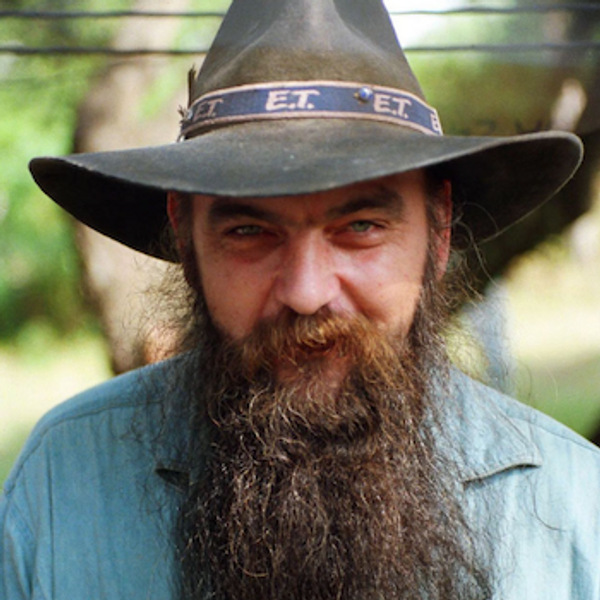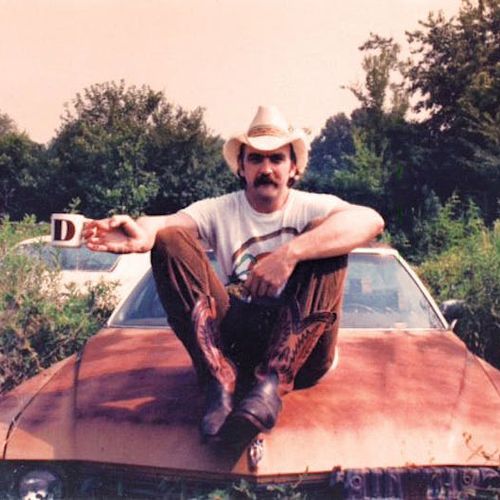




Link copied

Blaze Foley was one of the greatest country singer-songwriters to ever live. Unfortunately, as the story too often goes, that wasn’t recognized until after he was gone.
Blaze lived boldly, questionably and most of all obscurely. Until his untimely death in February 1989, he wrote songs that were the products of, almost maps to, his enigmatic existence. Like crumpled beer cans and bummed cigarettes on a barroom floor, they were littered with drunken prophecy, second-hand spirituality and beautiful poetry.
After an altercation took his life at the age of 39, the then-relatively unknown artist and much of his music was lost to time. Though some recordings have been unearthed and pieced together since - kept alive by the likes of Merle Haggard, Willie Nelson, John Prine and other country greats - friends, collaborators and passers-by have been left to tell much of his story, what parts of it they remember of what little he let show.
Veiled in myth and obscured by time, it’s a long, wavering road to fully grasping the legacy that Blaze left behind - he burned brightly and quickly, leaving little more than a puzzle of slurred song and choked up melody. Because he was often chalked up to a walking contradiction, the first step to understanding the legend would be to stagger alongside him, listening to the songs he sang.
Get to know Blaze Foley with these 15 Holler-picked essentials.
He can be spotted in the honky tonk-textured fable, ‘Life of a Texas Man,’ in which he sings of a down-and-out dreamer with very little direction but plenty of dreams to guide him, or in the shadows of ‘Down Here Where I Am’. He can also be heard battling demons in the ghostly ‘It’s Just You,’ or making a good timin’ tune out of agony in the liquored-up ballad ‘Getting Over You.’ He’s there in ‘Clay Pigeons,’ waiting to take your hand, his rich voice harboring hints of where he had been and where he was headed.
Born Michael David Fuller on December 18, 1949, Foley had a musical upbringing and grew up performing with his mother and siblings as the gospel outfit The Singing Fuller Family. Those religious songs he peddled early on seem to have informed his own gospel: one of last chances, of songs both wacky and wise; playful, yet poignant.
"It was the music that mattered to him,” his friend "Lost John" Casner said to The Austin Chronicle. “I think he realized that if he had wanted to … he could have made a living writing songs in Nashville, but those weren't the kind of songs he wanted to write. There's a gritty soul to his songs and the way he performed them. To be honest, Blaze wasn't always pretty. In a lot of ways he was an outcast. And [he] took that role - the Blaze persona, with all of the duct tape and all the paraphernalia and stuff. He was gonna do it his way and revel in it."
Foley was often dubbed the Duct Tape Messiah for his affinity toward the gray adhesive which he apparently used often and in excess to patch up his belongings. His songs worked much the same, mending him in a way. While many seem to sum up a life of should haves, could haves and would haves, where those shortcomings lived in his smokey chest, so did love and ambitions before them.
Before there was Blaze Foley, there was Dep’ty Dawg, a loveable nickname he had taken on in his twenties. Alongside him was his love, Sybil Rosen. They were two people with big dreams, living together in an artists’ community in Georgia. There, they made a home in a little treehouse that cradled them, nurturing their early love and budding aspirations, Blaze taking up songwriting and crafting several tunes, including ‘Livin’ in the Woods in a Tree’ and ‘The Moonlight Song.’
He and Sybil would soon leave their treehouse for Austin, so the now-branded Blaze Foley could pursue his songwriting. The bliss they felt among those Georgia pines would soon be washed out by the music town’s blinding neon and expectation.
“One of the things that complicated it was because it was a bar scene and the way that Depty felt there was a certain behavior expected of him to be that wild, crazy drunken guy, and perhaps he was right,” Sybil once told The Austin Chronicle.
As the epic of Blaze Foley goes, the pair shortly left Austin and returned to Georgia. From there, they departed again, this time for Chicago. Blaze soon left Chicago and Sybil for the road, parting with the tear-stained song, ‘If I Could Only Fly.’
He eventually found a home back in Austin where he fell into the tight-knit music community there, befriending fellow singing-songwriting legend Townes Van Zandt. However, heartache continued to tinge many of the songs he penned, the ghosts of love fading in and out of his faraway melodies. Even underneath the occasional dazed wisecrack and always dazzling nonsense, melancholy still tugs at the chest when his songs play.
Blaze was a complex individual, truly a walking contradiction. It has been said there were two sides to him, and at times, two different Blazes entirely. One was compassionate and caring. He was a believer in what was right and stood up against what he thought was wrong. In fact, he died defending a friend, attempting to deal out a type of vigilante justice that echoes in his tune, ‘You’ll Get Yours Aplenty.’
In the early morning hours of February 1, 1989, Blaze was visiting with a drinking buddy, Concho January, when Concho’s son, Carey, pulled a rifle on the singer. The two had confronted each other prior to that fateful night, having exchanged words over the belief that the younger January was stealing his father’s pension checks. Carey fatally shot Blaze in the chest that winter morning.
According to Blaze Foley: Killing of a Songwriter, Carey would claim self-defense, testifying, “He was coming at me … I could see fire in his eyes.”
"Blaze was a fighter for the things he believed in,” Casner added of his late friend to The Austin Chronicle. “Frankly, sometimes when he'd had too much to drink, he was a fighter for things that he believed in at the moment.”
The other side of Blaze was said to have been belligerent and biting, but that there couldn’t have been one without the other. “There's just a quality in the way he interacted with people as well as his music,” Casner said. “He looked into the very center of your soul and could tell if you were full of shit or not.”
Blaze lived and he did it fearlessly, at times recklessly, beautifully, but above all, honestly. His short time on this earth was spent lost in love and life and last calls, but found again in the words he sang, and the truths he shared with others.
While it took his passing for Blaze to be recognized among the singing-songwriting greats, his legacy has proven to be bulletproof. His songs now act as a road map, mile markers along the way to understanding a legend lost and found.
---






